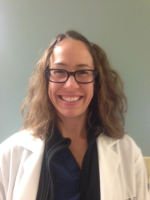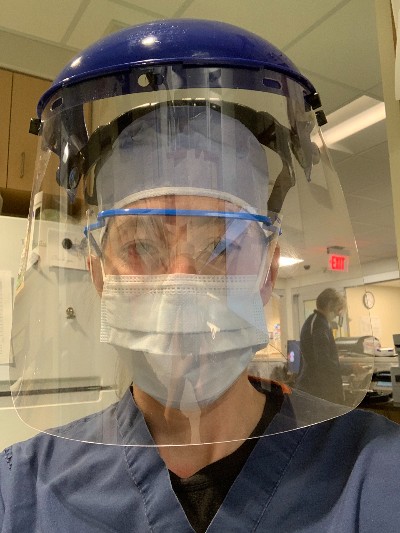Dr. Karen Crawford Receives Cochlear Implant to Better Assist Patients During the Pandemic, Ahead of World Hearing Day
AudiologyOnline: When did you first begin to experience hearing loss?

Karen Crawford, MD: My hearing loss started in the 8th grade/high school. I remember the girls on the volleyball court saying I needed ‘Miracle Ear.’ I went through college with honors and graduated medical school and did my residency in Emergency Medicine. When I was in the helicopter, I noticed it was difficult to hear with the headsets on and the background noise, etc. When evaluating patients, I was always on the patient’s right side and speaking directly to them. I tried hearing aids but didn’t find much improvement.
AudiologyOnline: Was there any hesitation when considering hearing loss technology? If so, what made you decide to move forward?
Karen Crawford, MD: Yes, I was very hesitant at first. There was the possibility of developing meningitis, vertigo, facial nerve paralysis and no longer having access to easy MRIs, but I moved forward because my hearing loss was so profound; I would otherwise have had to resign myself to continual frustration and lack of understanding speech if I continued to live and work without them.
AudiologyOnline: What were some of the emotions you experienced the first time you began to hear sound clearly?
Karen Crawford, MD: The biggest emotion I felt was shock. That I had lost so much of my hearing over time, that I had no idea how much was gone until they turned on the device. I also felt gratitude that I could hear again; especially in social situations where I was able to follow and participate in conversations in background noise. Gratitude I could talk on the phone with people again in confidence. A lot of relief that I was more independent and connected back to the world.
AudiologyOnline: Do you remember some of your favorite initial sounds?
Karen Crawford, MD: Sitting in the room with my audiologist I was cringing at just the AC buzzing. When I first flushed the toilet, it scared the daylights out of me! It was SO LOUD! Hearing birds sing, the clicker in my car, the refrigerator humming, the dryer buzzer... a million little sounds that normal hearing people take for granted, but I was recognizing again!
AudiologyOnline: How have your cochlear implants impacted your professional career?
Karen Crawford, MD: It is so much easier for me to communicate with patients and their families as well as the nursing staff. I am not 100%, but definitely hearing much better.
AudiologyOnline: How have your cochlear implants impacted your COVID-19 experience?
Karen Crawford, MD: With everyone wearing masks, I could no longer utilize lip reading, to some extent, in processing and understanding speech. Universal mask wearing sped up my decision to have my second ear implanted! Now I am more balanced and able to hear more clearly. I am so grateful my surgeon and audiologist were able to help me during the pandemic; they have been lifesavers!

Dr. Crawford at work wearing personal protective equipment (PPE).
AudiologyOnline: How has your quality of life and experiences (family time, work-life, etc.) been impacted by your hearing loss?
Karen Crawford, MD: My daughter is now 18 and she would get quite frustrated talking to me a room away or with my back turned or in the car as a kid. Children’s speech is still something I can struggle with, but I can hear her more clearly now. My husband is incredibly patient and really appreciates that I can hear more as well! Work is so much better too! The nurses would get frustrated I didn’t hear them when they were a few doors down or at their nurses’ station prior to my implants. My functionality has dramatically improved, and I am not using as much energy straining to hear in my environment. Walking in the neighborhood and hearing the birds, my dogs making funny sounds when they yawn, streaming through my phone and hearing people clearly… again, it’s all the little things one might take for granted, but those sounds are so amazing to hear again.
AudiologyOnline: If you could describe your cochlear implants in one word, what would it be?
Karen Crawford, MD: Life-changing.
AudiologyOnline: What advice do you have for audiologists who may not work directly with cochlear implants?
Karen Crawford, MD: If an audiologist notices that a patient's hearing loss fits the pattern or diagnostic range for a cochlear implant, please consider referring them to an audiologist who does work with cochlear implant patients. At first, I was reluctant to consider surgery, but when my audiologist explained they had maximized everything possible for assistance regarding my hearing loss, meeting with a cochlear implant audiologist was the right step forward. Establishing referral relationships are so beneficial for patient care and outcomes.
AudiologyOnline: What have you noticed to be the physical benefits of having bilateral cochlear implants?
Karen Crawford, MD: A physical benefit of bilateral implantation is having a sense of location when sounds are happening around me. Previously I only had my right ear implanted and directionality of sound was difficult to understand. I personally appreciate this balance, especially as a runner.
For more information on this topic, please visit www.cochlear.com


